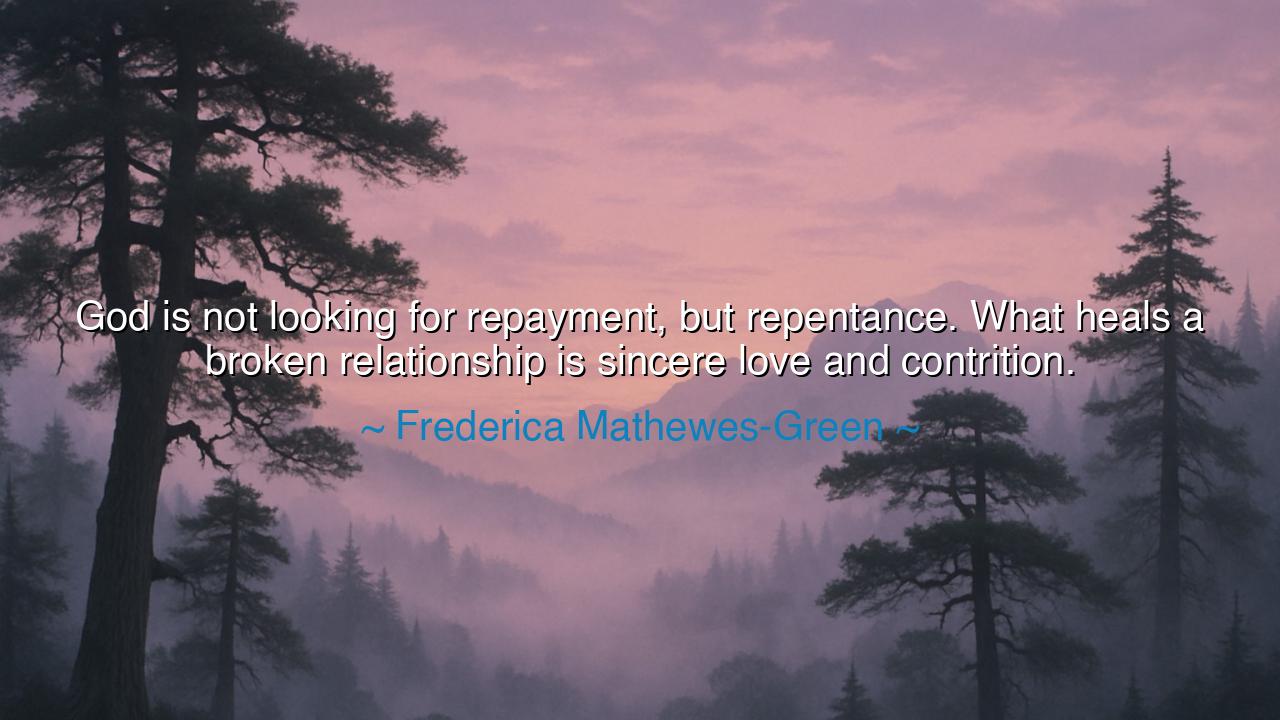
God is not looking for repayment, but repentance. What heals a
God is not looking for repayment, but repentance. What heals a broken relationship is sincere love and contrition.






When Frederica Mathewes-Green declares, “God is not looking for repayment, but repentance. What heals a broken relationship is sincere love and contrition,” she unveils the heart of divine mercy. Her words cut through the illusions of human pride, reminding us that the Eternal does not demand offerings of gold or the tallying of debts, but the humble turning of the soul. Thus the path back to wholeness lies not in recompense, but in return.
The origin of this wisdom springs from the ancient teachings of the faith, where prophets and saints have long proclaimed that sacrifice without heart is hollow. The cry of the Almighty has always been for repentance — the laying down of arrogance, the acknowledgment of wrong, and the movement toward healing. Mathewes-Green draws upon this sacred lineage, translating it for her listeners in words plain yet piercing, that all might grasp the simplicity of God’s desire.
To seek repayment is a human instinct, bound in law and transaction, but the divine way is different. God does not weigh our offerings upon scales of commerce; instead, He looks to the inward posture, to the contrition that bends the proud neck, and to the love that flows forth when forgiveness is embraced. This truth overturns the world’s logic, for the Eternal does not hunger for restitution, but for restoration.
The healing of any relationship, whether between man and God or between man and man, follows the same ancient law. Wrongs are not undone by mere recompense, but by the binding power of sincere love. Where there is honesty of heart, tenderness of spirit, and humility before the other, even what was shattered may be made whole again. Such is the divine pattern reflected in human bonds.
Let the generations to come remember: the truest gift is not repayment, but the offering of a broken spirit made humble. Repentance and contrition are the keys that open the door to mercy, and love is the balm that seals the wound. Thus, Mathewes-Green’s words stand as an eternal reminder that God’s desire is not the tribute of coins, but the transformation of the heart.






NTnam tam
I find it profound that the quote emphasizes love and contrition as the keys to healing. But I also wonder—how can we practice contrition when we feel so hurt by someone’s actions? Is it possible to let go of anger and truly forgive if we haven’t processed our emotions first? How do we find the balance between allowing ourselves to feel pain and still offering sincere love and repentance?
MTDoan Minh Tri
This quote challenges the idea of 'paying the price' for wrongdoing. It made me reflect on the idea that sometimes, we may seek justice or repayment from others, expecting them to 'make up' for their mistakes. But instead, repentance and sincere love seem like a higher calling. How can we apply this in our everyday relationships with family, friends, and even strangers? Is it easy to forgive without repayment?
NA4. Do Thi Ngoc Anh
It’s interesting how the quote places love and contrition at the heart of healing. But can we truly heal broken relationships if one party is not ready to acknowledge their wrongdoing or doesn’t feel remorse? How do we handle situations where the other person doesn’t want to repent or reconcile? Is sincere love enough, or does it take both sides for healing to happen?
YMYukiri Minamoto
The idea that God is looking for repentance instead of repayment is powerful. It makes me think about how we often approach apologies or trying to fix things with others. Do we really offer heartfelt apologies, or are we just trying to make things right for our own peace of mind? How do we know when an apology or act of contrition is genuine and not just a way to ease guilt?
LLinh
This quote really resonates with me. It suggests that in relationships, whether with God or others, it’s not about trying to 'pay back' past mistakes, but about sincere remorse and love. I wonder, though, how easy is it to truly experience contrition in a world where we’re often told to 'move on' or 'let go' quickly? Does true repentance require time and reflection, or can it happen in an instant?